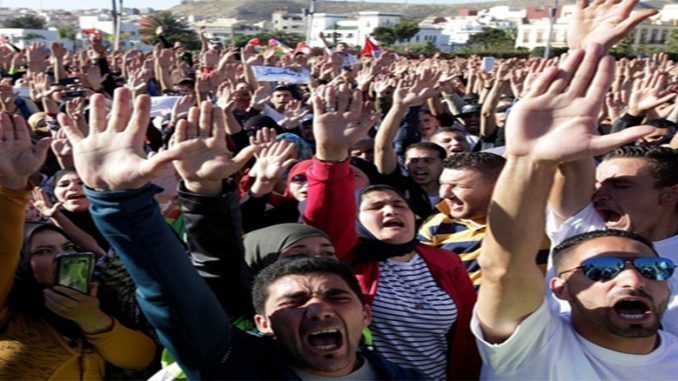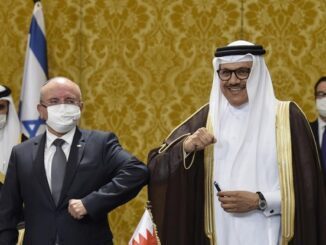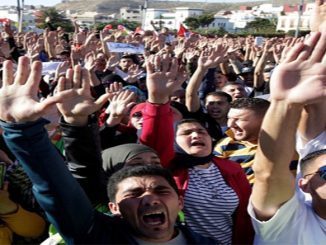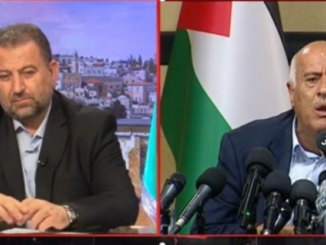
Thousands take to the streets in Morocco’s northern Rif region to demand jobs and end to injustice.
Thousands of people have taken to the streets of Morocco, demanding access to health services, jobs and investment.
Political protests are rare in the kingdom, but tensions in the town of Al Hoceima have been simmering since October following the death of a fish seller.
Mouhcine Fikr was crushed in a compresser truck while trying to save swordfish that had been confiscated by police.
Al Hoceima is in the northern Rif region. It is ethnically Berber and people say they have long been marginalised.
But will the protesters get what they are demanding, and where will it end?
Thousands take to the streets in recent protests
Thousands of Moroccans marched in the northern town of Al-Hoceima to protest against injustice and corruption on Thursday, May 18, seven months after a fishmonger was crushed inside a garbage truck there while trying to retrieve fish confiscated by the police.
Waving banners proclaiming “Are you a government or a gang?” and local protest flags, the march made its way peacefully through the center of Al-Hoceima, packing the main square under the watch of police and gendarmerie checkpoints.
Political protests are rare in Morocco, but tensions in Al-Hoceima have been simmering since October following the death of fishmonger Mouhcine Fikri.
The incident sparked outrage against “hogra”, a colloquial Derja Arabic term for deprivation of dignity because of official abuses or corruption, and prompted some of the largest protests since Arab Spring-inspired demonstrations in 2011.
Thursday’s marchers filled the main square and local businesses shut shops, cafes and restaurants in an unprecedented show of support. Crowds booed as they passed a police station.
“Our demands are clear, we want the removal of the security presence here, we want hospitals…. we want jobs, we want universities,” said 23-year old Mohammed Boumasoud, a member of the “Hirak” movement that denounces corruption.
Two police and three gendarmerie checkpoints filtered traffic entering the city, marking an increase from the usual level of security.
Moroccan authorities usually police protests heavily, nervous about unrest since the 2011 demonstrations. During those protests, Morocco’s king devolved some of his authority to an elected government in a constitutional reform.
Governments in North Africa are wary of protests tapping into frustrations among unemployed youth over jobs and a lack of development in marginalized areas. Tunisia this month saw protests that threatened to block gas production in the south of the country.
As crowds gathered in one square, Nasser Zefzafi, leader of “Hirak” rallied protesters over a megaphone. He has been the target of attacks in pro-palace media, who have accused him of being a separatist for the Rif region.
The anger over Fikri’s death, which shocked even staunch supporters of the palace, was a reminder the broader resentment at the establishment over joblessness and the gap between rich and poor that partly drove the 2011 pro-democracy protests.
Earlier this week, the Moroccan government released a statement acknowledging the protests in the Rif and urging officials to move quickly to implement a development strategy aimed at providing jobs.
Rif briefly declared independence in the 1920s during the resistance against Spanish colonial rule. Even after independence the region had a contentious relationship with central authorities, often claiming it has been abandoned.
“Mouhcine Fikri’s death was the last drop that made the glass overflow,” said activist Rabih Boushaaoul, a member of Hirak. “Fikri’s death woke the Rif up from a deep sleep.”
Latest development, Morocco police hunt Rif region protest leader
Moroccan authorities were engaged in a manhunt on Saturday, May 27, for a protest leader in the Rif region. His arrest was ordered for interrupting an imam’s prayer sermon following more than six months of social unrest.
The king’s prosecutor late on Friday ordered “the opening of an investigation and the arrest of Nasser Zefzafi” after he “obstructed, in the company of a group of individuals, freedom of worship in the Mohammed V mosque in Al-Hoceima”.
The northern port city has been rocked by protests since the death in October of a fishmonger crushed in a garbage truck as he protested against the seizure of swordfish caught out of season.
Calls for justice for Mouhcine Fikri, 31, in the ethnically Berber Rif region soon evolved into a grassroots movement demanding jobs and economic development, with Zefzafi emerging as the leader of the Al-Hirak al-Shaabi, or “Popular Movement”.
Zefzafi’s whereabouts on Saturday were unclear.
According to the prosecutor, the protest leader on Friday stopped “the preacher from continuing his sermon, giving a provocative speech in which he insulted the imam and fomented disturbances that undermined the calm and sacredness of the place of worship”.
Mobile phone footage shared on Facebook shows Zefzafi calling the imam a “liar”, asking whether mosques were built for God or those in power, and slamming “those who want to make the Rif capitulate”.
A relative of Zefzafi said the protest leader had managed to escape arrest as he left the mosque on Friday.
Shortly after, in footage broadcast on social media, the leader appeared on his rooftop in Al-Hoceima surrounded by supporters, saying: “I’m not scared. If they want to arrest me, let them come.”
The whereabouts of Nasser Zefzafi, centre, were unclear on Saturday [Youssef Boudlal/Reuters]
In another video posted afterwards, he said he was “safe and sound” and called for peaceful demonstrations.
His supporters said on Facebook his home had been searched.
A source at the interior ministry said Zefzafi had not been arrested, adding that young protesters had thrown stones at security forces on Friday in the city of some 56,000 inhabitants.
Official news agency MAP said clashes between demonstrators and police wounded several people, including three members of the security forces who were seriously injured.
Interior Minister Abdelouafi Laftit led a large government delegation on a visit to Al-Hoceima on Monday, May 22, the latest trip to the region to promise projects to boost the local economy.
Activists and Intellectuals Call for Meeting Rif Protestors’ ‘Legitimate’ Demands
A new initiative has been launched by Moroccan intellectuals and human rights and civil society activists, calling on the government to satisfy the demands of protesters in Rif.
The initiative issued a communiqué on Thursday, May 25, saying the social, economic and cultural demands of protesters are “legitimate.”
Signatories of the communiqué included writer and Amazigh activist Ahmed Assid, poet Salah El Ouadie, university professor Amina El Messaoudi and human rights activists Khadija Marouazi and Mohamed Neshnash.
Signatories to the communiqué said the protest movement “has been peaceful,” adding that the protests movement‘s demands can be satisfied “if there is truly a will to engage in a ‘serious’ dialogue with them.”
They called on “political actors to draw lessons” from the dynamic created by the protests movement and abstain from “accusations of treason” directed at the movement.
The communiqué stated that a diagnosis of the dysfunctions that led to the protests and dialogue “is the best way to deal with the demands,” insisting that “dialogue is not the end itself” and that its success depends on how much the state can deliver in terms of implementing the objectives agreed upon with the protesters.
“The process of reconciliation with the Rif region, which has been victim of many human rights violations, has to be completed,” reads the communiqué.
“The demands movement has to be dealt with consideration of social peace. The rights of citizens have to be guaranteed, including the right to peaceful protests.”
A call was issued to the government to speed up the realization of projects and development program in the city of Al Hoceima, including the establishment of a university hospital in the region.



